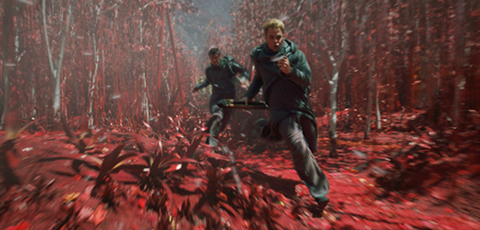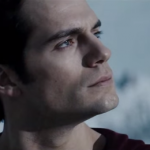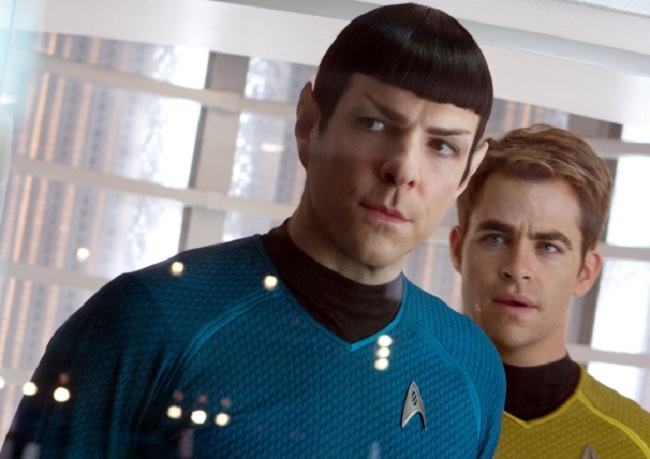
Rather than one of us writing an individual review for Star Trek Into Darkness, Bob and I thought it might be fun to team up Kirk-and-Spock style to discuss J.J. Abrams' second Trek film. Major spoilers to follow …
Tim: I'm going to break a cardinal rule in film analysis and admit I'm of two minds of Star Trek Into Darkness. On one level, J.J. Abrams' follow-up to the 2009 reboot is perfectly acceptable as grandiose, tightly-paced blockblustery. As a purveyor of bombastic summer overload, I can dig on a film that throws uber budget at its visual excesses the way STID does. My initial concerns, mainly that this would be a Star Trek grounded mainly on Earth, are proven unfounded. This is a film that shreds all over the galaxy and visits some pretty lavish set pieces in the process. As far as high-calorie, popcorn entertainment is concerned, STID succeeds.
But this is a bad Star Trek film, one that clearly doesn't have a firm grasp on the hallowed ground it's treading as its confused and foolhardy script manages to bungle entire characters (new and old), plot points and the very subject matter it clearly holds in some amount of disregard. I'm not going to hem and haw over the dumbing down of Trek, as I was fine with the direction Abrams took in the flawed but highly enjoyable reboot. My issues are more from a fundamental storytelling standpoint. And if you really dissect the components of this film, you're left with some rather infuriating quandaries.
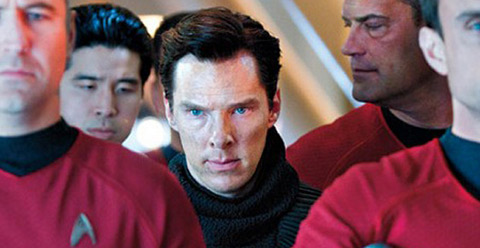
Does the good outweigh the bad? Can we stop worrying and love the cryo-tube torpedo? I'm guessing Bob has something to say about it…
Bob: So far, I feel ya, Tim. The fact is I'm probably the perfect mark for STID, as I'm a big enough Trek fan to catch most, if not all, of this film's references to the original Trek timeline, yet not enough of a super-fan to give a shit that Kirk is breaking the Prime Directive 10 minutes into the movie. In general, I approve of J.J.'s continuing mission to give us a 'roided-up version of Star Trek that does right by the franchise's characters but substitutes whiz-bang spectacle in place of nuanced sci-fi allegory. But despite the shift in tone, you still need a good story to drape all that spectacle over, and Abrams and his writers (Roberto Orci and Alex Kurtzman, with Damon Lindelof joining the fray for the sequel) are now 0-for-2 in this regard. So, as much as I want to love the movie, I can only moderately like it because the wonky, amorphous plotting is constantly dragging the film down.
Nowhere is this more apparent than with the film's pair of villains: Benedict Cumberbatch as Khan, Trek's biggest bad, and Peter Weller as Admiral Alexander Marcus, Starfleet's top commander, who wants to steer humanity toward intergalactic war. I don't know how a trigger-happy, power-mad officer managed to rise to Starfleet's highest rank (and it's probably best not to ask), but Marcus could have worked as an interesting villain had the movie bothered to at least once argue for his point of view. Instead he's treated as a loon wielding too much influence, with Weller giving off a "more than slightly unstable" vibe in every scene he's in. Then there's Cumberbatch's Khan, who fares even worse because his motives are never treated as anything more than what the script needs right now for its next big action piece. (I have no idea how blowing up a meeting of high-ranking Starfleet officers would get him one step closer to having his crew returned to him, and I suspect the film's writers don't either.) Also, his history in Trek lore is supremely glossed over here, so any attachment you have to him is based solely on how much Trek you've seen and what you bring into the theater with you. The film makes no real effort to sell Khan 2.0 as a villain to truly be reckoned with other than to say, "Surprise! Here's Khan!"
Tim: What frustrates me is the way the script introduces Khan and his lore without ever really defining or reinforcing Khan as a character. Here, he's just a name fans of the series will recognize. To the point where I wonder why Abrams and company even bother with the character at all. This is the dreaded In-Name-Only bastardization of a classic science-fiction character. Where Wrath of Khan added that layer of nuance with the inclusion of Melville's Moby Dick, STID is content to dumb down and homogenize Khan to the point of unrecognizability. So, while once a genetically enhanced Sheik conqueror and strategist, KINO is now relegated to pissed-off white guy with super strength. Where once we had "From Hell's heart, I stab at thee," we now have a Khan that's face-punched back into stasis.
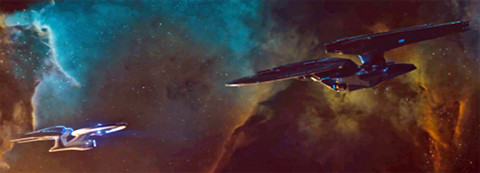
I claim no personal ownership or stake in the character, it just speaks to the bigger question Into Darkness keeps raising: Why go after such a cornerstone of the franchise if you're not going to use it properly? Khan feels like fan service, plain and simple, but you also have to wonder if this team feels some inherent need to placate an invested base as they knowingly move further away from it. The end-result is twofold: First, you open yourself to what's likely to be some rather unfair comparisons to a superior science-fiction film. Second, Khan's inclusion is unnecessary in regards to the bigger picture.
9/11 allegories are played out at this point, but that didn't stop this team from hashing out a Federation that's keen on manufacturing war. Orci's publicized conspiracy theories aside, the plot resembles what's already some well-covered territory. Weller's Admiral Marcus is manipulating the Federation into war with the Klingons. That, in and of itself, is a decent jumping off point for adventure. But they go too far and mire the story with KINO, supersoldiers in cryo-tube torpedoes and a completely unnecessary Carol Marcus. It's moments like the space dive with Khan and Kirk, where you forget why we're here and just revel in the danger and adrenaline of the whole thing, where you can finally allow yourself to get swept up in the film.
This is by no means the franchise's worst or dumbest film, but it's the one most lacking in what makes Trek Trek. Gene Roddenberry's creation was never really a reflection of society so much as a projection of what the best of society can someday become. This particular story doesn't work within its confines because it so completely misses the mark on a franchise that, up to now, has been about ideas. Worse, you can't blame this film's failings on a writer's strike here. The writing is every bit as lacking and misinformed as that of the previous effort. But that's to be expected when the writers of Transformers: Revenge of the Fallen team up with the writer of Prometheus.
Thankfully, there's a core cast in place with this franchise that continues to breathe life into these asinine scripts.
Bob: This new Trek could have been a complete disaster if not for the cast. But, oh man, this cast. They're 90 percent of the reason these films work at all, with Chris Pine and Zachary Quinto accounting for at least half of that. Quinto in particular practically lifts this movie up on his shoulders, carrying it further than Orci, Kurtzman and Lindelof could ever dream. I didn't mind Into Darkness attempting to mirror and put twists on earlier, more successful Trek movies, and Spock being the one to unleash that iconic "KHAAAAAAAAAAAAN" scream worked for me because Quinto completely sells the moment. He sells every moment. So does Pine, Karl Urban and the great Simon Pegg. (Zoe Saldana, John Cho and Anton Yelchin are little more than window-dressing this time out, but they're mighty fine windy dressing nonetheless.) The love/hate brotherly relationship between Kirk and Spock practically pours out of the screen, feeling so real to me that it nearly makes you forget the dumb story these characters are trapped in. I don't think anyone, in their wildest dreams, could have guessed that a new group of actors would bring these characters back to life so successfully, so reverentially and so completely. In a binary world, I'd still label this movie as "good," and the cast is by far the biggest reason why.
Tim: Cho and Yelchin are underused for sure, but everyone in the cast gets a turn. I think Saldana has a lot to offer in the first two acts but I agree, she too gets swept aside when the story has too many pieces spinning.
For everything surrounding the original series the film gets wrong (and it gets so much wrong), the relationship between Kirk and Spock is handled with aplomb. Quinto and Pine have a great deal of chemistry that's removed even from the characters they're playing – they just generally are good together. So much so that Karl Urban fades to the back a bit as the film really dials in on the Kirk and Spock relationship. Bones had a crucial part to play in Wrath's death scene, not so here. That's kind of par for the course with McCoy, even as Urban's DeForest Kelley impression adds some appreciated connective tissue to the earlier cast.
And what of the performances I didn't like? Cumberbatch is lost here. His Khan isn't much of anything script-wise, nor is Weller's Marcus, a character whose motivations also bend and fold scene to scene based on what direction the film wants to go. And poor Alice Eve, whose Carol Marcus doesn't even know why she's on the ship or what purpose she's meant to serve. By the time STID is over, neither do we. This isn't through any fault of the actors; it's just bad storytelling — but it shows in the performances.
Still, every time the movie threatens ridiculousness, Abrams rodeos in a hearty action sequence or dazzling set piece to immerse ourselves. It's like we're watching a tired, sweaty magician who all the sudden pulls a rabbit out of his ass. For the purposes of my metaphor, J.J. Abrams has a shit ton of rabbits.
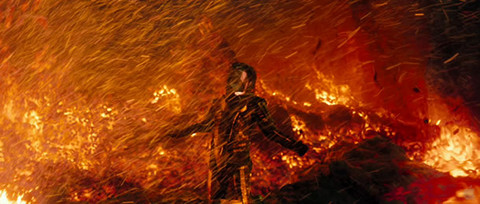
Bob: I continue to contend the guy's a good director getting better, at least from a technical and pacing standpoint. He just doesn't develop scripts to an acceptable level. But I loved Into Darkness's opening sequence with the crew trying to "deactivate" a live volcano before it obliterates an entire species. It's that old Indiana Jones trick of beginning your movie at the end of some off-screen adventure, and I don't know why more franchise movies don't do it. So many things are right about just that sequence. The design of the aliens and their home world is excellent. It re-introduces the primary players by showing us them in action. And it's exciting as hell. There are other bits just as good sprinkled throughout the movie, like the scene you mentioned where Kirk and Khan are rocketed from one starship to another. But the connective tissue holding these things together is exactly that — tissue. And not Kleenex. I'm talking the shitty off-brand stuff.
Tim: These Spielberg homages are expected of Abrams at this point, and here he pretty much lifts that entire sequence from Raiders wholesale. But that sequence may be the finest one in the film, if only because I think its more in line with a Star Trek I'd like to see than the film that actually follows it.
I like where we are by film's end, but Abrams' jump to Star Wars hopefully signifies the end for a trio of writers who need to be kept far away from science fiction properties like this. And Transformers. And Aliens. Paramount has a great cast in place, one that's rife with potential for a filmmaker who understands the importance of hanging a coherent story around engaging action framework. There can be a great Star Trek film on the horizon, but this isn't it. I enjoy STID at its most popcorny level. As an honest-to-Bones Star Trek film, I kind of loathe it.

